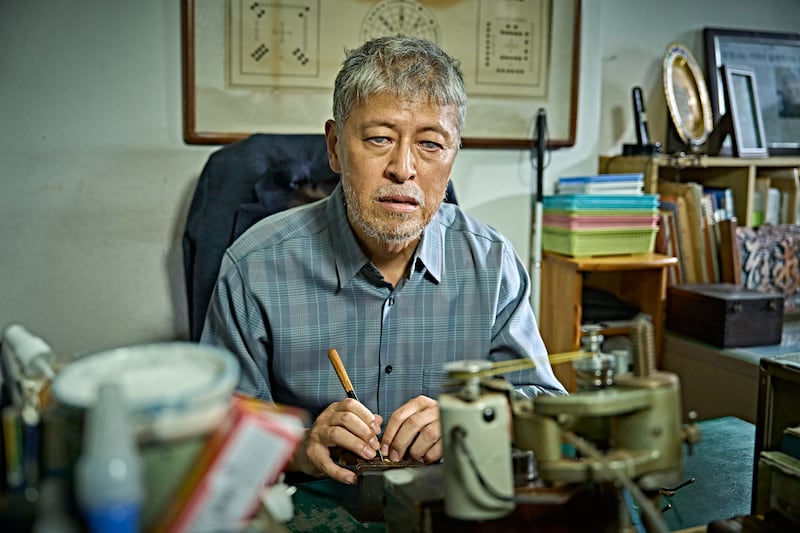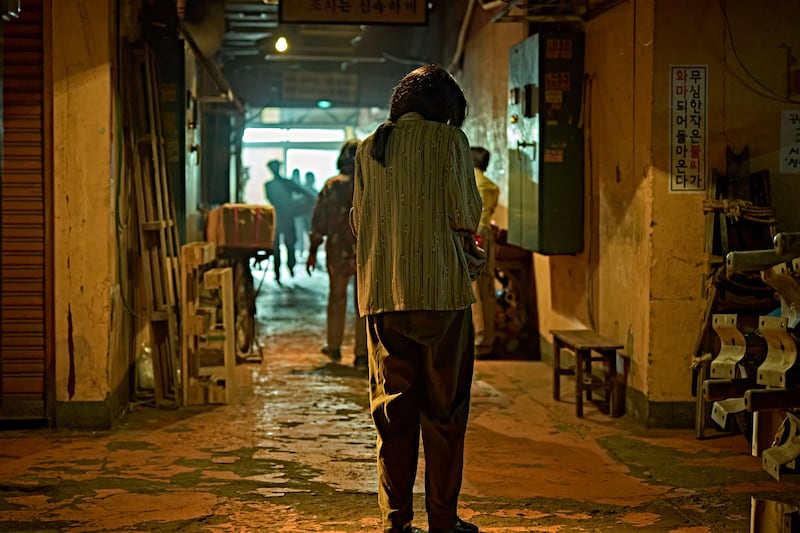The seen and the unseen conspire to bring about tragedy in The Ugly, a beguiling thriller from Train to Busan director Yeon Sang-ho in which dark secrets are slowly dragged into the light.
Rather than the blistering madness of his acclaimed zombie hit, the South Korean filmmaker’s latest—an adaptation of his graphic novel Face which premiered at the Toronto International Film Festival ahead of its Sept. 26 theatrical debut—is a patient and morose tale about a son’s investigation into a familial past about which he knows little. Divided into chapters and recounted via multiple testimonials, it builds to revelations that speak emphatically to social shallowness, pressures and prejudices—even if, in the end, its bombshells resonate as less surprising than inevitable.

A blind stamp engraver whose work has been hailed for its beauty (which he prizes above all else), Im Yeong-gyoo (Kwon Hae-hyo) is known as a “living miracle.” The subject of numerous glowing articles, he’s visited by producer Kim Su-jin (Han Ji-hyun) for a TV story about his amazing life and career, and as she questions him, Yeong-gyoo’s dutiful son Dong-hwan (Park Jeong-min) watches from the sidelines, proud of his dad’s achievements and legacy.
During their chat, Su-jin notices a scar on Yeong-gyoo’s hand whose origins he refuses to explain. When she spies an old photo of him at his original Cheongpung Engraving stand, she remarks upon his resemblance to his offspring—a notion that Dong-hwan appreciates.
Later, Yeong-gyoo admits that he has little use for such attention, but his early years are soon scrutinized when the police call to inform him and Dong-hwan that, 40 years after she went missing, their wife/mother Jung Young-hee (Shin Hyun-been) has been found.
At the morgue, Dong-hwan is presented with skeletal remains that were unearthed in a mountain near the Cheongpung Garments factory where Young-hee toiled in miserable conditions until her disappearance. Due to the bones’ condition, a cause of death can’t be determined, but the fact that she was located deep in the ground indicates that someone put her there—and, thus, that she was a victim of foul play.
Dong-hwan is stunned by this news, and Su-jin is excited by it, promptly calling her boss to convince him that this is the tantalizing angle she should pursue. Given a green light, she starts digging into Young-hee’s history. It doesn’t take long to find an initial clue, as Young-hee’s sisters and nephew show up at the funeral to relay that the reason there are no photos of Young-hee is that “her face was a bit ugly.”
Dwan-hwan is understandably taken aback by such an unkind assessment of his mom, especially from her closest relatives. Yet they continue badmouthing her, admitting that she ran away from home after accusing her father of cheating, and that because her claims shattered their clan (“That freak of a girl destroyed it with rumors!”), they never gave her whereabouts a second thought, much less worried that harm had come to her (“What kind of lunatic would kidnap a girl so ugly?”).
Their cruelty is unvarnished and unapologetic and, to Dong-hwan, hurtful, although it also piques his curiosity.
The Ugly is separated into five “interviews” conducted by Su-jin and Dong-hwan with those who knew or were connected to his parents, beginning with a trio of factory colleagues who report that, because of her hideous visage, Young-hee was referred to at work as “Dung Ogre.”
Such nasty appraisals are shocking, and they lace the suspenseful proceedings with malice; it’s easy to feel for Dong-hwan as he’s forced to hear, and learn, that everyone who knew his mother considered her a “monster.”

Flashbacks to Young-hee’s time at Cheongpung Garments take great care to hide her face from view, the better to keep her appearance a mystery. Additionally, it allows the focus to remain on the mean and hostile countenances of others, who treat her as a veritable dog save for the sightless Yeong-gyoo (played, as a twentysomething, by Park Jeong-min), whose favor she wins, resulting in marriage and, ultimately, a baby boy.
Subsequent sit-downs with Young-hee’s acquaintances flesh out her and Yeong-gyoo’s backstories as marginalized outcasts struggling to survive in a world that views them as curiosities (if not beasts) who deserve ridicule and harassment.
The Ugly condemns the intolerance faced by its protagonists. Through conversations with another worker and the factory’s boss Baek (Im Seong-jae), it illustrates the toll that hate takes on victims.
The push-pull between what’s visible on the outside and what exists on the inside dominates the second half of Sang-ho’s film, with Young-hee and Yeong-gyoo’s decades-ago relationship put to the test by not only their individual actions but, more crucially, their shared desire to prevent themselves (and, by extension, others) from suffering the mistreatment that’s hounded them since birth.
Measured and haunting, The Ugly revisits a yesterday teeming with unseemliness, whether it’s instances of physical violence or verbal and emotional abuse, and for a significant stretch, the material boasts an inviting degree of intimacy. By its midway point, however, the film provides an answer to its central question that’s deflatingly predictable, thereby undoing its preceding passages’ intrigue and relegating its back half to dramatizing an underwhelming series of events.
Worse, there’s scant complexity to this wannabe-eye-opener; despite his empathy for his main players, the writer/director’s conclusion is simple and straightforward, no matter the conflicted emotions it inspires in Dong-hwan.
In the years since Train to Busan, Sang-ho has struggled to regain the magic of his breakout smash, and while The Ugly’s understatement is more assured than the derivative action of 2020’s Peninsula and the outlandish sci-fi of 2023’s Jung_E, it isn’t enough to offset his tale’s two-dimensionality.
Even as its tightly coiled early going unravels, Park Jeong-min delivers an adept dual performance as both Dong-hwan and the younger Yeong-gyoo, and the film’s portrait of the twisted damage wrought by prejudice and persecution is often affecting.
Still, for a story about seeing beneath the surface—with regards to people, relationships, and corpses hidden six feet under—it rarely plumbs the sorts of depths that might make it more than an initially tantalizing, and eventually disappointing, whodunit.
The post ‘The Ugly’: A Mystery About the Ugliest Woman in South Korea appeared first on The Daily Beast.




